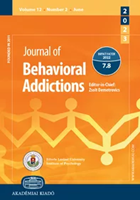How gambling harms others: The influence of relationship-type and closeness on harm, health, and wellbeing
How gambling harms others: The influence of relationship-type and closeness on harm, health, and wellbeing
Author(s): Catherine Tulloch, Matthew Browne, Nerilee Hing, Matthew J. Rockloff, Margo HilbrechtSubject(s): Individual Psychology, Social psychology and group interaction, Psychology of Self, Behaviorism
Published by: Akadémiai Kiadó
Keywords: gambling harms; concerned significant others; relationship closeness; health and wellbeing; finances; responsibilities; partners; family members;
Summary/Abstract: Concerned significant others (CSOs) can experience gambling-related harm, impacting their health and wellbeing. However, this harm varies depending on the type and closeness of the relationship with the person who gambles. We sought to determine the type and closeness of relationships that are more likely to experience harm from another person’s gambling, and examine which aspects of health and wellbeing are related to this harm. Methods: We examined survey data from 1,131 Australian adults who identified as being close to someone experiencing a gambling problem. The survey included information on relationship closeness, gambling-related harm (GHS-20-AO), and a broad range of health and wellbeing measures; including the Personal Wellbeing Index (PWI), the 12-item Short Form Survey (SF-12), and the Positive and Negative Affect Schedule Short Form (PANAS-SF). Results: CSOs in relationships where finances and responsibilities are shared were more likely to be harmed by another person’s gambling problem, particularly partners (current and ex) and family members. This harm was most strongly associated with high levels of distress and negative emotions, impacting the CSO’s ability to function properly at work or perform other responsibilities. Discussion and Conclusions: Support and treatment services for CSOs should consider addressing the psychological distress and negative emotions commonly experienced by CSOs.
Journal: Journal of Behavioral Addictions
- Issue Year: 12/2023
- Issue No: 3
- Page Range: 697-710
- Page Count: 14
- Language: English

